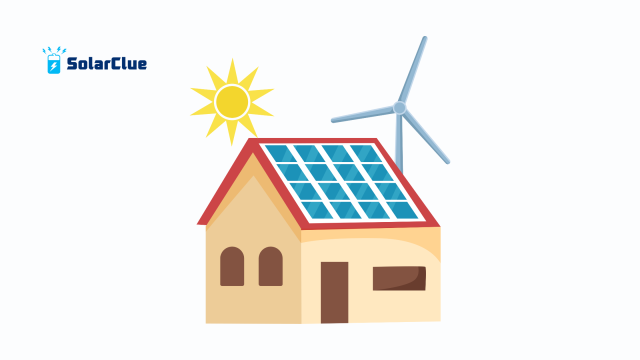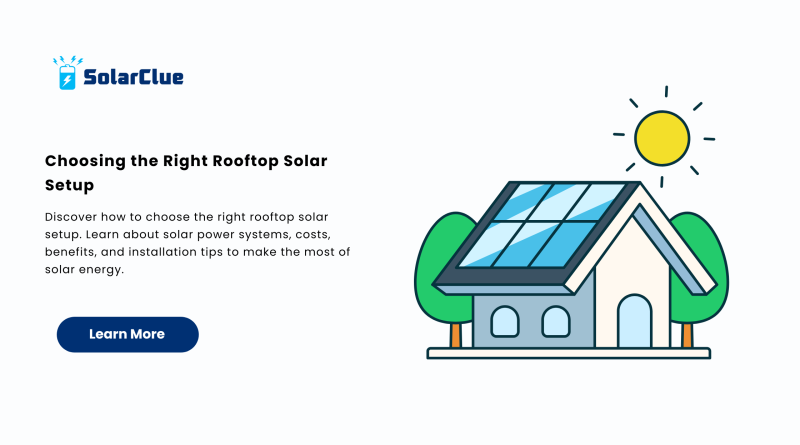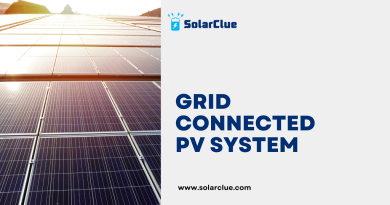Choosing the Right Rooftop Solar Setup
Choosing the Right Rooftop Solar Setup: As electricity prices climb and environmental awareness grows, many homeowners and businesses are turning to solar power for clean, cost-effective energy. Installing a rooftop solar setup is one of the most efficient ways to reduce dependence on the grid and save on monthly energy bills. With advances in solar panel technology and attractive government incentives, there’s never been a better time to invest.
Table of Contents
- 1 Understanding the Basics of Rooftop Solar
- 2 Types of Rooftop Solar Power Systems
- 3 Key Factors to Consider Before Installation
- 4 Choosing the Right Solar Panels
- 5 Inverters and Batteries: The Unsung Heroes
- 6 Government Policies and Incentives in India
- 7 Maintenance Tips for Longevity
- 8 Environmental and Financial Benefits
- 9 Common Myths About Rooftop Solar
- 10 Steps to Get Started
- 11 Choosing a Trusted Installer
- 12 FAQs
Understanding the Basics of Rooftop Solar
A solar power system for rooftops typically includes solar panels, an inverter, a battery (optional), mounting structures, and monitoring equipment. The panels capture sunlight, convert it to electricity through the inverter, and either store it or send it directly to your home’s electrical system. The efficiency of the entire setup depends on factors like sunlight exposure, roof angle, and panel quality.
Types of Rooftop Solar Power Systems
1. Grid-Tied System
These systems are connected to the electricity grid. Excess power generated is sent to the grid, often earning credits on your electricity bill.
2. Off-Grid System
Completely independent from the grid, off-grid systems use solar power stored in batteries to meet your energy needs. Ideal for remote locations.
3. Hybrid System
Combining the best of both worlds, hybrid systems use battery storage along with grid connectivity, offering energy security and flexibility.
Key Factors to Consider Before Installation
Roof Suitability and Space
Not all roofs are created equal. Check for adequate space, orientation (south-facing is best in the northern hemisphere), and shading from trees or nearby buildings.
Energy Consumption Patterns
Understanding your household or business’s energy use helps determine the right capacity for your solar power system.
Local Climate
More sunshine means more solar power. Regions with high sun exposure are naturally more suitable for solar panel setups.
Budget and Financing Options
Costs vary depending on system size and components. Government subsidies, loans, and solar leasing programs can ease the financial burden.
Choosing the Right Solar Panels

There are mainly three types:
- Monocrystalline Panels: High efficiency and sleek appearance
- Polycrystalline Panels: More affordable but slightly less efficient
- Thin-Film Panels: Lightweight and flexible but best for specific applications
Always compare warranties, efficiency ratings, and brand reputations when choosing solar panels.
Inverters and Batteries: The Unsung Heroes
The inverter converts DC electricity to usable AC. String inverters, microinverters, and power optimizers are common options. Batteries, like lithium-ion, store excess power for later use, offering energy independence especially in areas with frequent outages.
Government Policies and Incentives in India
India’s solar mission offers several incentives, such as:
- Up to 40% subsidy for residential rooftop solar systems under the PM Surya Ghar Yojana
- Net metering policies in most states
- Tax rebates and accelerated depreciation for commercial installations
Maintenance Tips for Longevity
- Clean panels regularly to avoid dust accumulation
- Monitor system performance using apps
- Schedule periodic checks with your installer
Environmental and Financial Benefits
- Solar power reduces carbon emissions
- Cuts electricity bills dramatically over time
- Increases property value
Common Myths About Rooftop Solar
“It’s too expensive”
Initial costs are offset by savings and incentives.
“Doesn’t work on cloudy days”
Solar panels still produce power with diffused sunlight.
“Too complex to maintain”
Modern solar power systems require minimal upkeep.
Steps to Get Started
- Site survey and feasibility study
- Choose the right system and installer
- Secure permits and financing
- Install and connect to the grid
Choosing a Trusted Installer
Look for certified professionals with proven track records. Read reviews, ask for references, and compare quotes.
FAQs
1. How much does a typical rooftop solar system cost?
Costs vary, but a basic 1kW system in India starts around ₹70,000–₹1,00,000 after subsidies.
2. How long do solar panels last?
Most have a lifespan of 25–30 years.
3. Can I go completely off-grid?
Yes, with a large enough system and sufficient battery storage.
4. What is net metering?
It allows you to send excess power back to the grid and receive credits.
5. Is installation complicated?
Not at all. A professional installer handles everything from design to permits.
Thinking about making the switch to solar? Whether you’re just exploring or ready to invest, visit SolarClue for expert guidance, or explore tips and insights at blog.solarclue.com.



